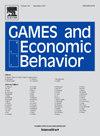别有用心的谋士
IF 1
3区 经济学
Q3 ECONOMICS
引用次数: 0
摘要
顾问向潜在买家披露有关某件物品的证据,而潜在买家并不知道该物品的价值或出售的盈利能力(顾问的动机)。我认为最优的披露规则是平衡两个目标:最大化销售的总体可能性,以及将销售从低盈利对象转向高盈利对象。我考虑了迫使顾问总是向买方透露其动机的规定的含义。我表明,这些政策是否会促使顾问披露有关该物品价值的更多证据,取决于买方对该物品的需求曲线。这一结果完善了我们对有承诺和没有承诺的顾问与被顾问沟通的有效监管的理解。本文章由计算机程序翻译,如有差异,请以英文原文为准。
Advisors with hidden motives
An advisor discloses evidence about an object to a potential buyer, who doesn't know the object's value or the profitability of its sale (the advisor's motives). I characterize optimal disclosure rules that balance two goals: maximizing the overall probability of sale, and steering sales from lower- to higher-profitability objects. I consider the implications of a regulation that forces the advisor to always reveal her motives to the buyer. I show that whether such policies induce the advisor to disclose more evidence about the object's value hinges on the curvature of the buyer's demand for the object. This result refines our understanding of effective regulation of advisor-advisee communication with and without commitment.
求助全文
通过发布文献求助,成功后即可免费获取论文全文。
去求助
来源期刊

Games and Economic Behavior
ECONOMICS-
CiteScore
1.90
自引率
9.10%
发文量
148
期刊介绍:
Games and Economic Behavior facilitates cross-fertilization between theories and applications of game theoretic reasoning. It consistently attracts the best quality and most creative papers in interdisciplinary studies within the social, biological, and mathematical sciences. Most readers recognize it as the leading journal in game theory. Research Areas Include: • Game theory • Economics • Political science • Biology • Computer science • Mathematics • Psychology
 求助内容:
求助内容: 应助结果提醒方式:
应助结果提醒方式:


